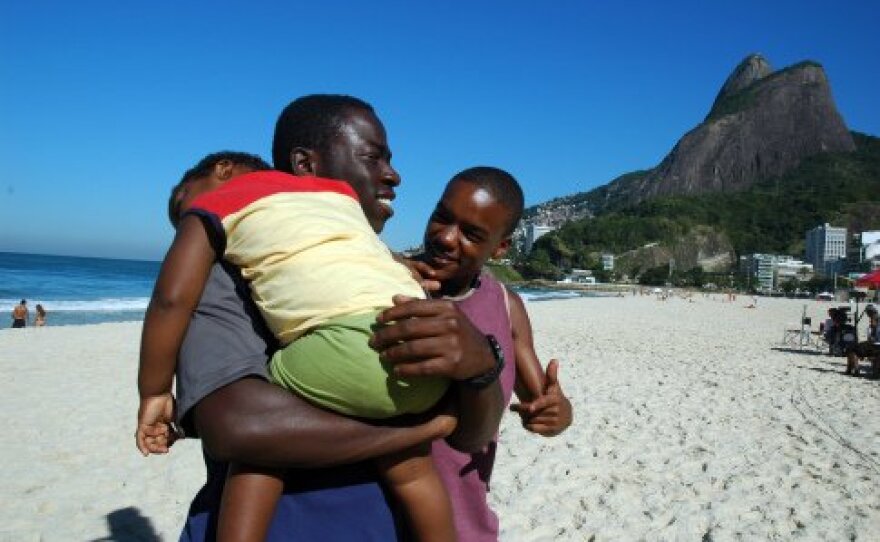City of God served up a sprawling saga of slum life, taking us through three decades and following multiple characters.
City of Men narrows the focus down to a pair of young men, Acerola or Ace (Douglas Silva) and Laranjinha or Wallace (Darlan Cunha), who are both about to turn eighteen. Ace is already married and has fathered a child. He mourns his unexciting sex life. The first and onlyh woman he had sex with got pregnant and he ended up marrying her. Wallace, on the other hand, expresses concern over the fact that he doesn't know who his father is and when he turns eighteen his I.D. card will say "father unknown." This leads the two friends on a sometime humorous search for Wallace's father.
Meanwhile, Ace's wife Cris (Camila Monteiro) is thinking about accepting a job outside Rio to care for another woman's baby. This means that Ace will have sole responsibility caring for his son Clayton. That doesn't bode well for Clayton since we witness Ace forgetting his son at the beach when he is asked to baby-sit for an afternoon.
Paul Morelli's City of Men, a companion piece to Fernando Meirelles' City of Gold (Miramax)
Morelli's film looks to the men within this slum community and keeps the women on the periphery. Ace's wife leaves in order to make enough money for them to get a house. Wallace's grandmother leaves when her apartment is burned down during a gang war. Other women enter briefly for sex or romance, but none remains a constant. For the most part this is a film appropriately -- as the title implies -- focused on men, be they the rivals in a gang war, estranged fathers, wanna-be gangsters, or men trying to find a way to live outside the violence.
As in City of God, City of Men depicts the Rio slums as crowded, cramped quarters where street gangs rule. Morelli favors graceful aerial shots of the hilly slums, overbuilt with shacks, homes and apartments. These shots convey the scope of the problems and how entrenched they seem to be. The ramshackle housing seems to go on forever. Morelli shows that the violence has become almost routine within this setting. When a gang war spills onto the streets, residents know to immediately take shelter as stores quickly close up. But as the gunfire rings out, people try to just go about their daily life. Ace and Cris even engage in a marital squabble, not even noticing the gunfire outside the door.
What becomes interesting is how Ace and Wallace, who have managed to stay outside the violence for the most part, start to get pulled in once they uncover information about their fathers. Loyalty to these men they have never known threatens to pull the friends apart, and give them cause to enter a cycle of violence based on honor and revenge.

City of Men (Miramax)
But in a way, the violence in City of Men feels less threatening than it did in City of God . It's definitely omnipresent, and we do see some innocent people killed, yet it doesn't feel as dangerously woven into Ace and Wallace's lives. But maybe that's because Morelli is trying to pull these characters out of the violence and suggest that there is a way out, that these young men can change.
Silva and Cunha are amazing as the young friends. One thing that gives the film an added richness is that these actors worked on Meirelles' TV show back in 2002, and shot nineteen episodes over the next couple years. This allows Morelli to show us footage of these characters as boys hanging out together. Seeing them as fourteen year olds in some of the flashbacks lets us see a joy and fun that they are fast losing. It gives a greater texture to their friendship and conveys an intensified sense of loss as they get pulled apart. When we first see Silva and Cunha as Ace and Wallace on the beach in the first part of the film, they still seem so young but as we get to know them they reveal the complexity of their lives and the difficult decisions they have to face. These two young performers never strike a false note.
Reflecting the growing maturity of the characters, City of Men takes on a very different style from City of God. Meirelles' film won acclaim for its epic scope, flashy editing and energized camerawork. But director Paulo Morelli opts for a more restrained and intimate approach. Morelli has a few frenzied moments of violent activity, but for the most part he favors a slower pace, and steadier visuals as focuses in on faces and conversations. The few scenes involving women are soft focus blurs, conveying a surreal sense as if in a dream. City of Men also allows for a greater sense of hope and even humor than City of God . You could describe City of God as being all about the frenzy of youth burning out on its own energy whereas City of Men is about these young men trying to find a way out of the violence, and the cycle of men abandoning their sons.
City of Men (in Portuguese with English subtitles, and rated R for violent content, language and some sexuality) has wonderful heart and spectacular performances. It wanders a bit but ultimately is well worth spending time with. It manages to find guarded hope amidst the daily tragedies.
Companion viewing: City of God, Pixote, City of Men (Brazilian TV series now on DVD)






